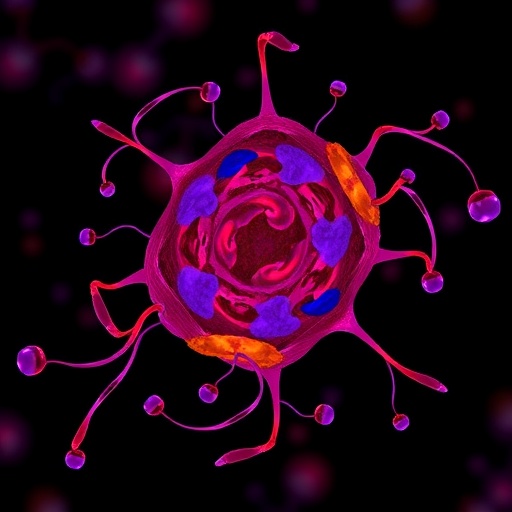
In the relentless search to understand cancer’s evasive tactics, renal cell carcinoma (RCC), a complex kidney malignancy, stands out for its enigmatic interplay with the immune system. Central to this interaction is the programmed death-ligand 1 (PD-L1), a protein that tumors deploy to suppress immune attacks, effectively cloaking themselves from the body’s natural defenses. Recent groundbreaking research has uncovered the pivotal role played by two critical molecular regulators—E3 ubiquitin ligases and deubiquitinases—in modulating PD-L1 in RCC, revealing new frontiers in oncology and immunotherapy.
PD-L1 serves as a key immune checkpoint molecule on tumor cells, binding to its receptor PD-1 on T cells, thereby impairing cytotoxic activity and allowing cancer cells to escape immune surveillance. The regulation of PD-L1 is notoriously intricate, governed at multiple levels including gene transcription, protein translation, and post-translational modifications. Among these, ubiquitination—a process where ubiquitin molecules tag proteins for degradation or functional modulation—has emerged as a decisive post-translational mechanism. E3 ubiquitin ligases and deubiquitinases orchestrate this ubiquitin tagging and removal, respectively, thus finely tuning PD-L1 stability and abundance.
The recent study led by Akbar, Pandey, and Viswanathan illuminates how E3 ligases and deubiquitinases influence PD-L1 expression and stability within the hostile tumor microenvironment of RCC. These enzymes represent a molecular seesaw; while certain E3 ligases add ubiquitin moieties to PD-L1, targeting it for proteasomal degradation, specific deubiquitinases counteract this by stripping ubiquitin chains, rescuing PD-L1 from destruction and sustaining its immune-suppressive function. This dynamic balance decisively impacts RCC progression and treatment responsiveness.
.adsslot_ERILwzO7mX{width:728px !important;height:90px !important;}
@media(max-width:1199px){ .adsslot_ERILwzO7mX{width:468px !important;height:60px !important;}
}
@media(max-width:767px){ .adsslot_ERILwzO7mX{width:320px !important;height:50px !important;}
}
ADVERTISEMENT
RCC is known for its heterogeneous and immunosuppressive microenvironment, sustaining chronic inflammation and evading T cell cytotoxicity. The study highlights how altered ubiquitination pathways exacerbate PD-L1-mediated immune resistance in RCC, thereby shielding the tumor from immune checkpoint blockade therapies. These findings implicate that modulating E3 ligases or deubiquitinases could recalibrate PD-L1 levels, rendering tumors more susceptible to immunotherapeutic interventions.
Mechanistically, E3 ligases such as FBXO22 and Cbl-b have been implicated in tagging PD-L1 for degradation, often functioning as tumor suppressors by curtailing PD-L1’s immune evasion capabilities. Conversely, deubiquitinases like USP22 and USP9X have emerged as oncogenic facilitators, stabilizing PD-L1 and perpetuating immune checkpoint activity. Thus, these enzymes form a complex regulatory network influencing RCC’s immune landscape.
The implications extend beyond molecular biology into clinical oncology, where PD-L1 expression levels serve as biomarkers predicting patient response to PD-1/PD-L1 inhibitors. Understanding the ubiquitination dynamics controlling PD-L1 equips clinicians with novel avenues to enhance immunotherapy efficacy, especially in RCC patients refractory to existing treatments. Targeting the E3 ligase-deubiquitinase axis could potentiate immune checkpoint blockade, overcoming adaptive tumor resistance.
Additionally, this research sheds light on the intricate crosstalk between ubiquitination machinery and the tumor microenvironment, including stromal fibroblasts, immune infiltrates, and cytokine signaling networks that collectively influence RCC progression. The modulation of PD-L1 via ubiquitin pathways intersects with hypoxia-inducible factors and metabolic reprogramming, indicating a multifaceted regulatory schema integrated with tumor metabolism and immune evasion.
Future therapeutic strategies may focus on developing small molecule inhibitors or activators tailored to specific E3 ligases or deubiquitinases involved in PD-L1 regulation. Such precision medicine approaches could selectively destabilize PD-L1 in tumor cells, augmenting antitumor immunity without broadly suppressing ubiquitination, thus reducing systemic toxicity. Moreover, combination regimens integrating ubiquitination modulators with standard PD-1/PD-L1 inhibitors could unleash synergistic effects, amplifying tumor eradication.
The study also highlights the potential of ubiquitination markers as prognostic tools in RCC, enabling stratification of patients based on the ubiquitin-mediated regulatory status of PD-L1. This biomarker-driven approach may refine patient selection for immunotherapy, optimizing clinical outcomes and minimizing unnecessary exposure to immune checkpoint inhibitors.
Expanding the scope, investigations into how other immune checkpoints are regulated through similar ubiquitination mechanisms warrant attention, potentially revealing unified principles of immune modulation by ubiquitin ligases and deubiquitinases. Such insights could revolutionize cancer immunotherapy paradigms across various malignancies beyond RCC.
From a molecular standpoint, the structural biology of E3 ligase-PD-L1 and deubiquitinase-PD-L1 interactions remains an exciting frontier. High-resolution crystallography and cryo-electron microscopy studies could unravel the precise binding interfaces and enzymatic mechanisms, facilitating rational drug design with enhanced specificity and potency.
In conclusion, the intricate ballet between E3 ligases and deubiquitinases orchestrates the fate of PD-L1 in RCC, critically affecting the tumor’s immune landscape and therapeutic response. This revelation opens a promising chapter in cancer immunology and targeted therapy, offering hope for durable, effective interventions against RCC’s notorious immune evasiveness.
The ongoing research beckons the scientific community to delve deeper into the ubiquitin system’s role in cancer immunoregulation, potentially unlocking a treasure trove of novel targets and treatments. As studies continue to decode these molecular interactions, the vision of personalized, ubiquitination-informed cancer therapeutics edges closer to reality, heralding a new era in oncology where immune escape is systematically dismantled at its molecular roots.
Subject of Research: The role of E3 ligases and deubiquitinases in regulating PD-L1 expression and the tumor microenvironment in renal cell carcinoma.
Article Title: The role of E3 ligases and deubiquitinases in PD-L1 regulation and the tumor microenvironment in renal cell carcinoma.
Article References:
Akbar, A.N., Pandey, S. & Viswanathan, P. The role of E3 ligases and deubiquitinases in PD-L1 regulation and the tumor microenvironment in renal cell carcinoma. Med Oncol 42, 389 (2025). https://doi.org/10.1007/s12032-025-02878-z
Image Credits: AI Generated
Tags: deubiquitinases and immune regulationE3 ligases in cancer therapyE3 ubiquitin ligases in immunotherapyimmune checkpoint proteins in oncologymolecular mechanisms of PD-L1 regulationnovel strategies for RCC treatmentPD-L1 modulation in RCCpost-translational modifications in cancerrenal cell carcinoma immune evasionrole of PD-1 in immune responsetumor microenvironment and PD-L1ubiquitination and cancer progression





